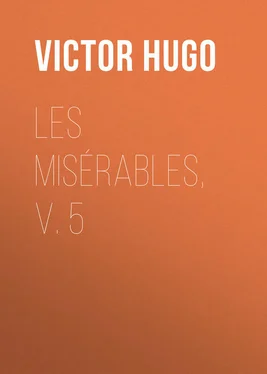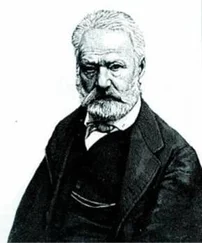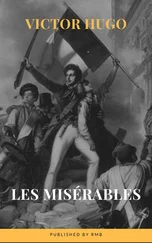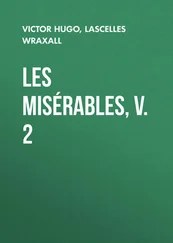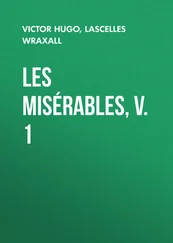Victor Hugo - Les Misérables, v. 5
Здесь есть возможность читать онлайн «Victor Hugo - Les Misérables, v. 5» — ознакомительный отрывок электронной книги совершенно бесплатно, а после прочтения отрывка купить полную версию. В некоторых случаях можно слушать аудио, скачать через торрент в формате fb2 и присутствует краткое содержание. Жанр: literature_19, foreign_antique, foreign_prose, на английском языке. Описание произведения, (предисловие) а так же отзывы посетителей доступны на портале библиотеки ЛибКат.
- Название:Les Misérables, v. 5
- Автор:
- Жанр:
- Год:неизвестен
- ISBN:нет данных
- Рейтинг книги:3 / 5. Голосов: 1
-
Избранное:Добавить в избранное
- Отзывы:
-
Ваша оценка:
- 60
- 1
- 2
- 3
- 4
- 5
Les Misérables, v. 5: краткое содержание, описание и аннотация
Предлагаем к чтению аннотацию, описание, краткое содержание или предисловие (зависит от того, что написал сам автор книги «Les Misérables, v. 5»). Если вы не нашли необходимую информацию о книге — напишите в комментариях, мы постараемся отыскать её.
Les Misérables, v. 5 — читать онлайн ознакомительный отрывок
Ниже представлен текст книги, разбитый по страницам. Система сохранения места последней прочитанной страницы, позволяет с удобством читать онлайн бесплатно книгу «Les Misérables, v. 5», без необходимости каждый раз заново искать на чём Вы остановились. Поставьте закладку, и сможете в любой момент перейти на страницу, на которой закончили чтение.
Интервал:
Закладка:
Enjolras did not appear to listen; but any one who had been near him might have heard him murmur, in a low voice, Patria. Bossuet laughed again, when Courfeyrac shouted, "Here's something fresh."
And assuming the voice of a groom of the chambers who announces a visitor, he added, – "Mr. Eight-Pounder."
In fact, a new character had come on the stage; it was a second piece of artillery. The gunners rapidly got it into position by the side of the first one, and this was the beginning of the end. A few minutes later both guns, being actively served, were at work against the barricade, and the platoon fire of the line and the suburban National Guards supported the artillery. Another cannonade was audible some distance off. At the same time that the two guns were furiously assaulting the redoubt in the Rue de la Chanvrerie, two other pieces placed in position, one in the Rue St. Denis, the other in the Rue Aubry le Boucher, were pounding the St. Merry barricade. The four guns formed a lugubrious echo to one another, the barks of the grim dogs of war answered one another. Of the two guns now opened on the barricade of the Rue de la Chanvrerie, one fired shell, the other solid shot. The gun which fired the latter was pointed at a slight elevation, and the firing was so calculated that the ball struck the extreme edge of the crest of the barricades, and hurled the broken paying-stones on the heads of the insurgents. This mode of fire was intended to drive the combatants from the top of the redoubt, and compel them to close up in the interior; that is to say, it announced the assault. Once the combatants were driven from the top of the barricade by the cannon, and from the windows of the public-house by the canister, the columns of attack could venture into the street without being aimed at, perhaps without even being seen, suddenly escalade the barricade, as on the previous evening, and take it by surprise.
"The annoyance of these guns must be reduced," said Enjolras; and he shouted, "Fire at the artillerymen!"
All were ready: the barricade, which had so long been silent, was belted with flame; seven or eight rounds succeeded one another with a sort of rage and joy; the street was filled with a blinding smoke, and at the expiration of a few minutes there might be confusedly seen through the mist, all striped with flame, two thirds of the artillerymen lying under the gun-wheels. Those who remained standing continued to serve the guns with a stern tranquillity, but the fire was reduced.
"Things are going well," said Bossuet to Enjolras; "that is a success."
Enjolras shook his head, and replied, —
"Another quarter of an hour of that success, and there will not be ten cartridges left in the barricade."
It appears that Gavroche heard the remark.
CHAPTER XV
GAVROCHE OUTSIDE
Courfeyrac all at once perceived somebody in the street, at the foot of the barricade, amid the shower of bullets. Gavroche had fetched a hamper from the pot-house, passed through the gap, and was quickly engaged in emptying into it the full cartouche-boxes of the National Guards killed on the slope of the barricade.
"What are you doing there?" Courfeyrac said.
Gavroche looked up.
"Citizen, I am filling my hamper."
"Do you not see the grape-shot?"
Gavroche replied, —
"Well, it is raining; what then?"
Courfeyrac cried, "Come in."
"Directly," said Gavroche.
And with one bound he reached the street. It will be borne in mind that Fannicot's company, in retiring, left behind it a number of corpses; some twenty dead lay here and there all along the pavement of the street. That made twenty cartouche-boxes for Gavroche, and a stock of cartridges for the barricade. The smoke lay in the street like a fog; any one who has seen a cloud in a mountain gorge, between two precipitous escarpments, can form an idea of this smoke, contracted, and as it were rendered denser, by the two dark lines of tall houses. It rose slowly, and was incessantly renewed; whence came a gradual obscurity, which dulled even the bright daylight. The combatants could scarce see one another from either end of the street, which was, however, very short. This darkness, probably desired and calculated on by the chiefs who were about to direct the assault on the barricade, was useful for Gavroche. Under the cloak of this smoke, and thanks to his shortness, he was enabled to advance a considerable distance along the street unnoticed, and he plundered the first seven or eight cartouche-boxes without any great danger. He crawled on his stomach, galloped on all fours, took his hamper in his teeth, writhed, glided, undulated, wound from one corpse to another, and emptied the cartouche-box as a monkey opens a nut. They did not cry to him from the barricade, to which he was still rather close, to return, for fear of attracting attention to him. On one corpse, which was a corporal's, he found a powder-flask.
"For thirst," he said, as he put it in his pocket.
While moving forward, he at length reached the point where the fog of the fire became transparent, so that the sharp-shooters of the line, drawn up behind their parapet of paving-stones, and the National Guard at the corner of the street, all at once pointed out to one another something stirring in the street. At the moment when Gavroche was taking the cartridges from a sergeant lying near a post, a bullet struck the corpse.
"Oh, for shame!" said Gavroche; "they are killing my dead for me."
A second bullet caused the stones to strike fire close to him, while a third upset his hamper. Gavroche looked and saw that it came from the National Guards. He stood upright, with his hair floating in the breeze, his hands on his hips, and his eyes fixed on the National Guards who were firing, and he sang, —
"On est laid à Nanterre,
C'est la faute à Voltaire,
Et bête à Palaiseau,
C'est la faute à Rousseau."
Then he picked up his hamper, put into it the cartridges scattered around without missing one, and walked toward the firing party, to despoil another cartouche-box. Then a fourth bullet missed him. Gavroche sang, —
"Je ne suis pas notaire,
C'est la faute à Voltaire;
Je suis petit oiseau,
C'est la faute à Rousseau."
A fifth bullet only succeeded so far as to draw a third couplet from him, —
"Joie est mon caractère,
C'est la faute à Voltaire;
Misère est mon trousseau,
C'est la faute à Rousseau."
They went on for some time longer, and the sight was at once terrific and charming; Gavroche, while fired at, ridiculed the firing, and appeared to be greatly amused. He was like a sparrow deriding the sportsmen, and answered each discharge by a verse. The troops aimed at him incessantly, and constantly missed him, and the National Guards and the soldiers laughed while covering him. He lay down, then rose again, hid himself in a doorway, then bounded, disappeared, reappeared, ran off, came back, replied to the grape-shot by putting his fingers to his nose, and all the while plundered cartridges, emptied boxes, and filled his hamper. The insurgents watched him, as they panted with anxiety, but while the barricade trembled he sang. He was not a child, he was not a man, he was a strange goblin gamin, and he resembled the invulnerable dwarf of the combat. The bullets ran after him, but he was more active than they; he played a frightful game of hide-and-seek with death: and each time that the snub-nosed face of the spectre approached the gamin gave it a fillip. One bullet, however, better aimed or more treacherous than the rest, at length struck the will-o'-the-wisp lad; Gavroche was seen to totter and then sink. The whole barricade uttered a cry, but there was an Antæus in this pygmy: for a gamin to touch the pavement is like the giant touching the earth; and Gavroche had only fallen to rise again. He remained in a sitting posture, a long jet of blood ran down his face, he raised both arms in the air, looked in the direction whence the shot had come, and began singing, —
Читать дальшеИнтервал:
Закладка:
Похожие книги на «Les Misérables, v. 5»
Представляем Вашему вниманию похожие книги на «Les Misérables, v. 5» списком для выбора. Мы отобрали схожую по названию и смыслу литературу в надежде предоставить читателям больше вариантов отыскать новые, интересные, ещё непрочитанные произведения.
Обсуждение, отзывы о книге «Les Misérables, v. 5» и просто собственные мнения читателей. Оставьте ваши комментарии, напишите, что Вы думаете о произведении, его смысле или главных героях. Укажите что конкретно понравилось, а что нет, и почему Вы так считаете.
